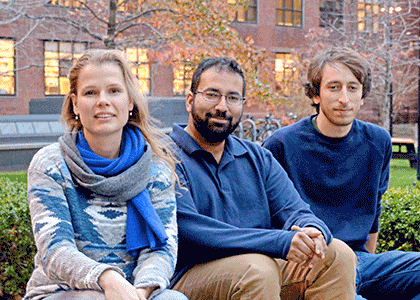(l to r) H. Sophie Knobloch-Bollmann, Shankar Mukherji and Marco Fumasoni
We are pleased to announce the following MCB postdocs have been awarded fellowships in 2015. Congratulations to Marco Fumasoni from the Murray Lab, Hanna Sophie Knobloch-Bollmann from the Hensch Lab, Shankar Mukherji from the O’Shea Lab, and Philip Abitua and Nathan Lord from the Schier Lab. Their research attracted attention from domestic and international fellowship committees and covers a range of topics including neuroscience, genome evolution, cancer and cellular development.
About the Research
Marco Fumasoni
Murray LabAIRC, Associazione Italiana per la Ricerca sul Cancro and the European Molecular Biology Organization Long Term Fellowship
Project Titles: “Adaptive strategies to constitutive replication stress” and “Analysis of the replisome plasticity and its consequences for genome evolution”, respectively
Fumasoni aims to understand the evolvability of DNA replication machinery, called the replisome, and its consequences for genome evolution. Using budding yeast as a model, Fumasoni will use experimental evolution to probe the plasticity of the replisome to genetic disturbances and study strategies cells find to adapt to replication stress, considered to be one of the earliest hallmarks during cancer development.
H. Sophie Knobloch-Bollmann
Hensch LabFeodor Lynen Research Fellowship
Project Title: Oxytocin control of critical periods for social brain development
Sophie’s research investigates the effects of abnormal oxytocin signaling following trauma on critical periods of social brain development. Oxytocin is a hormone that plays a critical role in intimacy and social bonding, among other things. Researchers know that adversity during early life can have detrimental effects on cognitive abilities, mental health and sociability that last a lifetime. But the consequences of these developmental trajectories in oxytocin signaling at a molecular, cellular and circuit level are unclear. By studying changes in the oxytocin system linked neuromodulator systems and inhibitory maturation following early trauma, Sophie hopes to pinpoint a time window for plasticity—a critical period for experience-dependent development—in higher order cognitive brain areas. If successful, her research could lead to therapies to prevent negative long-term consequences.
Shankar Mukherji
O’Shea LabCharles A. King Trust Postdoctoral Research Fellowship
Project Title: The role of mRNA localization in establishing and maintaining organelle identity
Mukherji will investigate the role mRNA and translation play in organelle development. All eukaryotic cells contain organelles—structures with specialized functions critical for life, such as protein translation by ribosomes and energy production in mitochondria, for example. For these critical functions go off without a hitch, organelles have receptors that ensure the correct proteins are transported into their interiors. When the receptors are missing or incorrect, organelles malfunction. Quantitatively understanding the role of mRNA localization and spatially restricted translation in this process can yield insights into mechanisms underlying a wide variety of developmental and metabolic diseases known as organelle biogenesis disorders.
Philip Abitua
Schier LabDamon Runyon Cancer Foundation Postdoctoral Fellowship
Project Title: Functional characterization of signaling molecules during zebrafish embryogenesis
Abitua aims to uncover new signaling molecules with roles in embryonic development and disease, especially cancer. A prevailing mechanism of cancer cell formation is the redeployment of old signaling pathways used during embryonic development. The erroneous use of these pathways can drastically change cell behaviors resulting in loss of adhesion and an increase in protrusive activity. Ultimately, these changes can cause healthy cells to invade surrounding tissue, leading to metastases. Using zebrafish as a model, Abitua will systematically analyze the function of more than a dozen newly identified signaling molecules expressed during development in hopes of identifying a gene involved in cellular proliferation or motility. If successful, his findings could provide the foundation for future clinical and therapeutic studies.
Nathan Lord
Schier LabThe Arnold O. Beckman Postdoctoral Fellows Program
Project Title: Mechanisms of morphogen gradient interpretation
Lord’s research investigates how embryonic cells figure out where they are and what they do once fully developed. Successful embryonic development depends on the precise control of constituent cells—some must decide to form the heart, some the brain, and some the skin, all in the proper place, time, and proportion. In many cases, instructions are passed to cells through signal molecules called ‘morphogens’. While processes such as morphogen production and movement—which allow the instructions to be passed along in the embryo—have been well studied, it remains unclear how each cell makes sense of these signals and decides what to do using this information. Using zebrafish, an organism ideal for watching development unfold in real time, Lord hopes to understand how morphogen concentration gradients impact gene expression patterns and how those patterns are refined and corrected as cells decide their fate. A deeper understanding of how cells sense and respond to this signaling system, which often malfunctions in cancer, may have implications for treating human disease.


